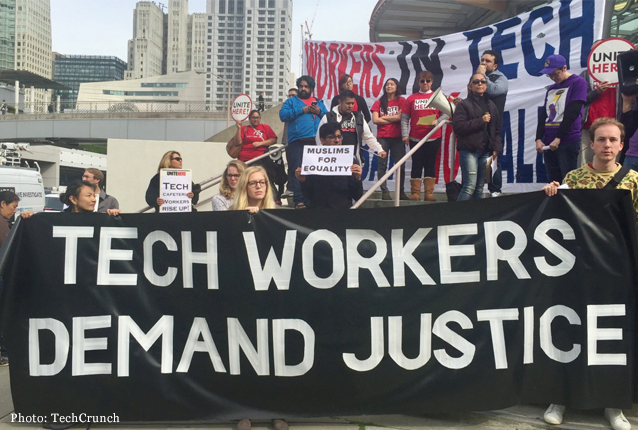In the weeks since Attorney General Jeff Sessions announced the Trump Administration would end the Deferred Action for Childhood Arrivals (DACA) program, many corporate executives, especially in the technology sector, have issued statements in defense of the nearly 800,000 young people who have been able to work or go to school without fear since President Obama first put the DACA program in place. But while these tech companies claim to be committed to protecting Dreamers, they fail to mention their role in pushing tech careers farther out of reach for immigrants and all working people.
The H-1B guest worker visa program permits companies to sponsor employees for temporary work in the United States. It allows corporations to recruit highly skilled employees when they cannot find qualified hires in the U.S. But without strong oversight or regulations, corporations are not required to look for qualified applicants in the U.S. first, and can use H-1B visas to replace existing employees. So in reality, tech companies, public utilities and other corporations have taken advantage of the program to facilitate outsourcing and turn once-desirable careers in technology and IT into temporary, unsustainable jobs.
Though top tech companies like Microsoft, Facebook, Google and Apple might argue they use the H-1B program to attract the “best and brightest,” all signs point to their real interest in attracting cheaper, more exploitable sources of labor. The industry’s widespread use of the visa program brings wages down and lowers work standards for everyone in tech. Remember, these same corporations colluded to limit recruitment of each other’s employees in order to depress wage growth. Additionally, tech companies frequently do not sponsor permanent status for their H-1B employees, leaving these workers reliant on their employers to remain in the United States. H-1B employees have few legal rights and are less likely to speak up against abuses at work or support campaigns to join together in union, which might explain why Silicon Valley executives are so keen on expanding the program.
While it is critical for everyone to fight to restore legal protections for Dreamers and win permanent protection for all 11 million undocumented people in this country, tech companies that truly want to support Dreamers must also commit to creating good, family-sustaining careers. In an industry plagued by concerns about diversity in technical positions, executives should be taking steps to expand the number of permanent positions open to Black and Brown applicants, including Dreamers, not to limit them.
As Silicon Valley and the entire tech sector join the fight for dignity and protection for those living without documentation, they must do so without ulterior motives. We should reform the H-1B program to protect visa holders and the entire U.S. workforce, not to take advantage of a low-road outsourcing model. After all, if H-1B is allowed to expand unchecked and even more careers are outsourced into temporary, precarious jobs, where are Dreamers supposed to work?





